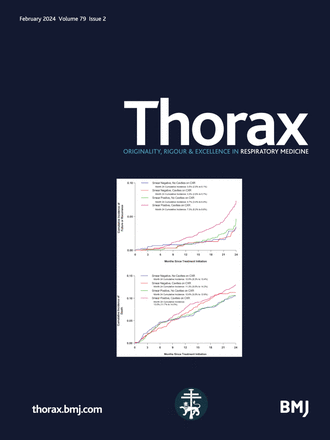杂志俱乐部
IF 7.7
1区 医学
Q1 RESPIRATORY SYSTEM
引用次数: 0
摘要
预测严重过敏性哮喘患者对omalizumab(一种抗ige单克隆药物)的反应是具有挑战性的。[J] .中华呼吸与急救杂志,2009;21(3):387 - 387。doi:10.1164/ rccm.202310-1730OC)进行了SoMOSA研究,以评估omalizumab的临床疗效,并确定先进的组学生物标志物来指导治疗。SoMOSA研究是一项为期1年、开放标签、真实世界的研究,纳入了216例严重、不受控制的特应性哮喘患者,这些患者在前一年至少有两次发作,服用大剂量吸入皮质类固醇(有或没有维持口服皮质类固醇)。在前16周使用全球治疗效果评估(GETE)评分评估对omalizumab的早期反应。63%的患者有早期阳性反应,69%的患者在整个治疗期间急性发作减少≥50%。在接受维持性口服皮质类固醇治疗的患者中,57%的患者能够将剂量减少至少一半。重要的是,虽然传统的生物标志物(血液嗜酸性粒细胞、呼出一氧化氮分数和总IgE)不能预测反应,但通过气相色谱-质谱和血浆脂质分析对呼出气体进行分析,发现了一组独特的挥发性有机化合物和脂质标志物,可以高精度地预测临床改善(接受者…本文章由计算机程序翻译,如有差异,请以英文原文为准。
Journal club
Predicting response to omalizumab, an anti-IgE monoclonal, in severe allergic asthma is challenging. Djukanović et al (Am J Respir Crit Care Med. 2024;210(3):288–297. doi:10.1164/rccm.202310–1730OC) conducted the SoMOSA Study, to evaluate the clinical efficacy of omalizumab and to identify advanced omics biomarkers to guide therapy. The SoMOSA study was a 1 year, open-label, real-world study enrolling 216 patients with severe, uncontrolled atopic asthma, who were on high-dose inhaled corticosteroids (with or without maintenance oral corticosteroids) with at least two exacerbations in the previous year. Early response to omalizumab was assessed using the Global Evaluation of Treatment Effectiveness (GETE) score in the first 16 weeks. Early positive response was found in 63%, and 69% experienced a≥50% reduction in exacerbations over the full treatment period. Among those receiving maintenance oral corticosteroids, 57% were able to reduce their dose by at least half. Importantly, while conventional biomarkers (blood eosinophils, fractional exhaled nitric oxide, and total IgE) did not predict the response, analysis of exhaled breath via gas chromatography–mass spectrometry and plasma lipid profiling identified a distinct panel of volatile organic compounds and lipid markers that predicted clinical improvement with high accuracy (receiver …
求助全文
通过发布文献求助,成功后即可免费获取论文全文。
去求助
来源期刊

Thorax
医学-呼吸系统
CiteScore
16.10
自引率
2.00%
发文量
197
审稿时长
1 months
期刊介绍:
Thorax stands as one of the premier respiratory medicine journals globally, featuring clinical and experimental research articles spanning respiratory medicine, pediatrics, immunology, pharmacology, pathology, and surgery. The journal's mission is to publish noteworthy advancements in scientific understanding that are poised to influence clinical practice significantly. This encompasses articles delving into basic and translational mechanisms applicable to clinical material, covering areas such as cell and molecular biology, genetics, epidemiology, and immunology.
 求助内容:
求助内容: 应助结果提醒方式:
应助结果提醒方式:


